How Long Do Hybrid Car Batteries Last? (Average Lifespan)
Hybrid electric vehicles are now mainstream, a revolution from science fiction fantasies just decades ago. Offered widely by Toyota, Honda, Ford, and more, hybrid power is here to stay as our commute evolves. But concerns persist around hybrid battery life and replacement costs outweighing fuel savings.
If you’re conflicted or questioning hybrid battery longevity wondering “how long do they last?”, read on for a comprehensive guide dispelling myths and answering all you need to know about these lynchpins of greener transportation.
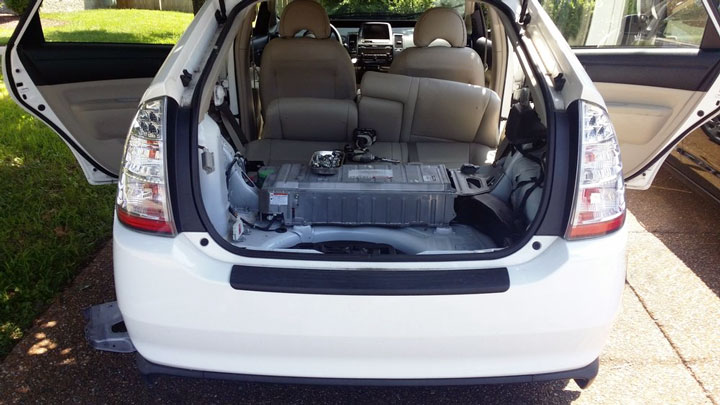
Related: Hybrid Cars vs Gas Cars (Costs to Consider)
Average Lifespan of a Hybrid Car Battery
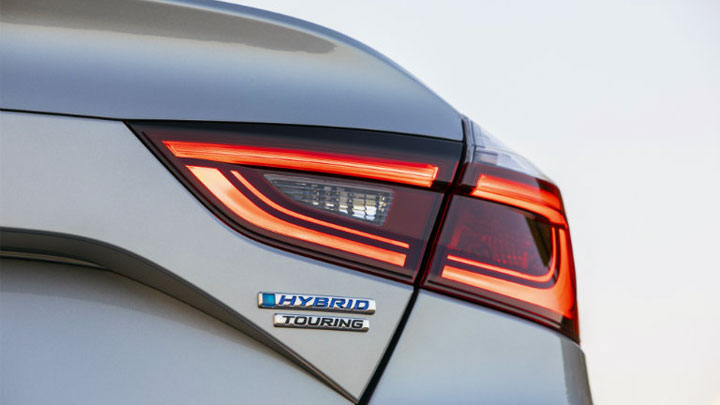
One of the biggest misconceptions related to hybrid-electric batteries is that they have relatively short lifespans. This leads to apprehension toward the thought of being saddled with the cost of pricey battery replacement on numerous occasions throughout a vehicle’s applicable service life.
The truth is, the vast majority of hybrid owners will only need to replace their main battery on one occasion throughout their vehicle’s service life.
In fact, it is extremely rare to hear of a vehicle’s hybrid battery being replaced on more than two separate occasions, even in extreme high-mileage scenarios.
Most vehicle manufacturers claim that their hybrid batteries carry an average lifespan of 80,000-100,000 miles. However, it is relatively common to hear of a well-maintained hybrid battery lasting 150,000-200,000 miles.
This means that even in a worst-case scenario, a vehicle must total an average of 240,000 miles before perceivably reaching the point of requiring a third battery replacement. As with any battery, proper maintenance is key to hybrid battery longevity.
See Also: How Long Do Normal Car Batteries Last?
Hybrid Battery Replacement Cost
Best places to order parts? See: 19 Best Online Auto Parts Stores
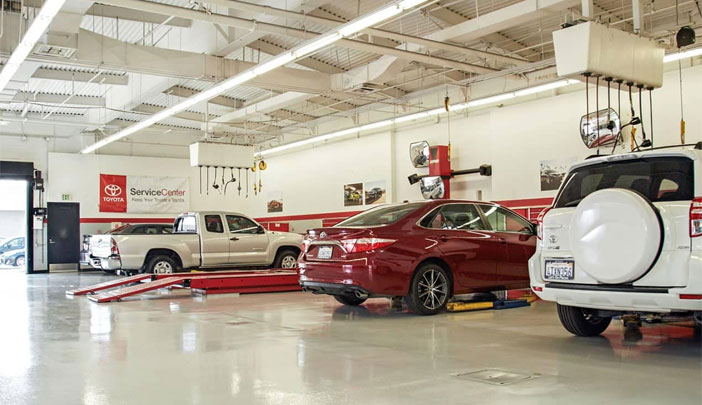
The relative cost of hybrid battery replacement can vary significantly from one scenario to the next. However, services of this nature are dropping in cost by the day, as manufacturers employ cost-saving measures, and battery technology improves.
On average, motorists can expect to pay $2,000-$8,000 for hybrid battery replacement. While this might seem like a wide range in potential price, there are a significant number of variables that go into tabulating such costs.
As time passes by, a greater number of good, used hybrid batteries are coming available from salvaged wrecks. These batteries can typically be purchased for a significantly reduced cost, and can then be installed by a qualified service professional.
In this scenario, the lower end of the above-mentioned price spectrum applies.
However, if a new hybrid battery must be purchased, and installation proves to be rather time consumptive, giving way to growing labor costs, one can expect to pay a higher fee.
Regardless, any qualified service center should be able to provide you with an accurate price quote before installation commences.
Related: Hybrid Car Oil Change (Cost and Change Interval)
What Affects a Hybrid Battery Lifespan?
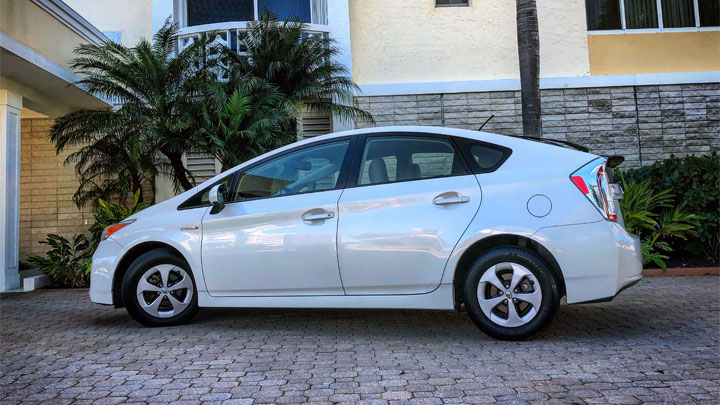
Numerous factors affect the lifespan of a hybrid electric battery. The most prominent of these factors are as follows.
#1 – Charging Routine
To maximize a hybrid battery’s longevity, it is imperative to follow all manufacturer-provided charging guidelines.
Never plug your hybrid up for a quick 5-minute charge, before soldiering on with a near-dead battery. It is always best to fully charge a hybrid whenever doing so is required.
#2 – Temperature Fluctuations
Hybrid-electric batteries are intended to operate within a specified temperature range. If a battery of this nature is forced to operate outside of this range for extended periods of time, damage can result.
Regularly driving a hybrid vehicle in areas such as Arizona or parts of Canada will reduce the lifespan of its battery, the same way the lifespan of a normal car’s battery is affected.
Most hybrid batteries utilize a dedicated cooling fan to prevent overheating. It is advisable to have this cooling fan regularly checked for proper operation, by a qualified service technician.
#3 – Frequency of Maintenance
Most manufacturers specify that a hybrid battery is to be tested at predetermined service intervals. Skipping out on such check-ups can certainly detract from your battery’s service life.
If one or more weak battery cells are detected, yet all other cells appear to be functioning as intended, reconditioning efforts can be made to prolong unit life.
When Should You Replace a Hybrid Battery?
Because of the cost associated with the purchase and installation of a hybrid battery, preemptive replacement is generally not advisable.
A hybrid battery should be replaced when a questionable health test is recorded during routine maintenance, or when the first signs of impending failure become evident.
Most automotive dealerships who sell hybrid-electric vehicles will check your vehicle’s battery as a complimentary service. These regular tests will provide you with a certain level of insight into when replacement is warranted.
Likewise, a number of symptoms will often arise when a hybrid battery is on its last leg, cluing you in on when the need for replacement is imminent.
These symptoms include shortened charge life, irregular fluctuations in charge state, decreased fuel economy, and increased engine reliance.
Does Your Car Warranty Cover Battery Replacement?
All manufacturers provide some level of coverage pertaining to hybrid electric batteries found in their vehicles. The length and extent of this warranty often vary significantly from one manufacturer to the next.
In any event, if a battery dies during its period of coverage, replacement should be provided free of charge, or on a prorated basis.
The following are several examples of hybrid-electric battery warranties currently offered by various manufacturers.
| Manufacturer | Warranty Length |
|---|---|
| Toyota/Lexus (2020+) | 10-years or 150,000 miles |
| Toyota/Lexus (2019 and older) | 8-years or 100,000 miles |
| Honda | 8-years or 100,000 miles |
| Ford | 8-years or 100,000 miles |
| Hyundai | 10-years or 100,000 miles |
| Kia | 10-years or 100,000 miles |
| Chevrolet | 8-years or 100,000 miles |
Types of Hybrid Batteries
Today, manufacturers employ the use of several different hybrid battery types in their production efforts. Each of these individual battery types vary somewhat in their construction, and means of operation.
The following are the three main types of hybrid-electric automotive batteries.
Lithium Ion
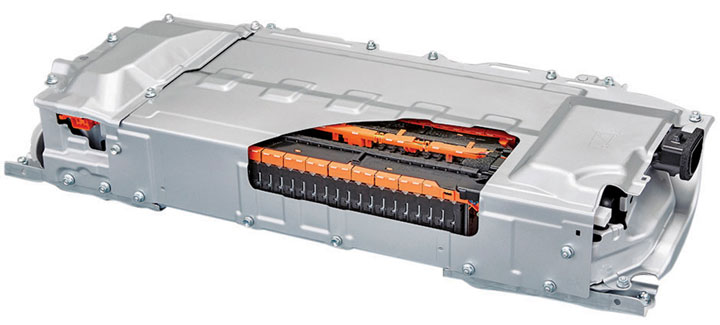
Lithium ion batteries offer enhanced service lives, and are growing significantly in popularity among automotive manufacturers. These batteries typically come with longer warranties, in excess of 100,000 miles, and offer brief charging times.
However, lithium ion batteries tend to be relatively expensive in comparison to alternative hybrid battery types.
Nickel Metal Hydride
Nickel Metal Hydride (NiMH) batteries are by far, the most commonly used of all hybrid electric automotive batteries. Batteries of this nature are stable and feature predictable usage characteristics.
Nickel Metal Hydride batteries are also less costly than lithium ion batteries, as they have now been on the market for a significant period of time. This type of battery has been a mainstay of Toyota Prius production for two-decades.
Lead Acid
Lead acid batteries are perhaps more reliable than any alternative form of battery on the market. However, they are relatively limited in their capabilities and storage potential.
The average lead acid battery is only capable of continuously operating a vehicle for an average of 10 miles in full-electric mode, and 20 miles in hybrid mode. Therefore, lead acid batteries are far more practical in a hybrid situation.
- P0480 Code (Symptoms, Causes, and How to Fix) - Apr 19, 2024
- Car Temperature Gauge Stopped Working? (Here’s Why) - Apr 15, 2024
- Ignition Coil vs Coil Pack (What’s the Difference?) - Apr 8, 2024

As I suspected, buying a hybrid to save $ on fuel won’t work, because you will be spending extra $ on the initial purchase, plus extra $ on a replacement battery at least once during the life of the car. I did use a rental hybrid for a week in urban Boston commuting, and the powertrain provided a much more pleasant driving experience than the comparable conventional powertrain, due to the battery/electric motor being used in stop & go areas.
I think you are too worried. I was before I bought a PHEV. Battery Failure rate for 2nd generation Prius is 1/1000 at 200,000 miles. I think it is 1/3000 in 3rd generation . Depending on how much you drive you save a lot of money with the hybrid or phev. We drive about 18k per year so a lot. Our fuel savings on year 1 with a clarity phev was $1972 (measured, not just calculated). Cost on vehicle after government rebate was $26500 for touring edition. Hence after 14 years best case scenario, the car will be free and then $1500+ extra savings per year. Batteries globally are warrantied for 8y/100k miles. California compliant states are 10y/150k(which we live in). Worse case scenario we have a 1/1000 lemon. Battery dies at 160k. We replace and go another 150k for $6k. Still better than gas. Or battery slowly degrades and at 250k I am driving gas only with battery holding 20% getting 40 mpg. Most modern car batteries degrade to about 90% capacity and then lose about 1%/yr. (I think a lot of people worry because the 1st generation leaf batteries weren’t cooled and died about 5 years in. We also bought a used 2nd gen leaf after our clarity. 2015, 60k miles, battery is 92% state of health. Should easily last at least 200k miles before replacing battery.) plus don’t forget other savings. No oil changes. No radiator upkeep. B/c > 50% of breaking is with magnets, haven’t even had to replace brakes Yet and last inspection a year ago they said >80% left (on the 60k miles leaf)
Thank s lot